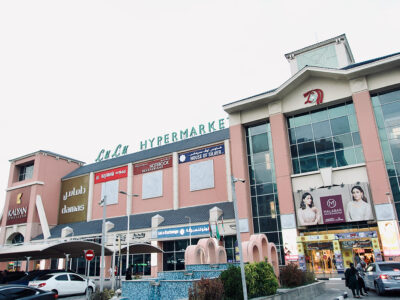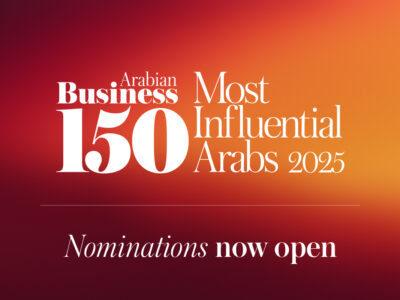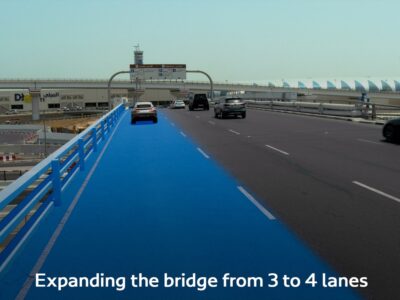Saleh Abdulla Lootah is used to Dubai’s ever-changing landscape. “I used to study in the US,” the man chosen to lead his firm’s property development arm says, relaxing into his armchair. “But whenever I came back, I used to get lost due to the number of roads being constructed.
“It’s like we’re living in a company rather than a country, with all the new initiatives that are being announced, almost on a daily basis.”
You couldn’t accuse Lootah of being lost these days. As Dubai’s property market ramps back up into full growth mode, he’s hoping to position the company he represents – Lootah Real Estate Development (LRED) – into a third-party developer of choice for larger players. While the firm itself has been around since 2000, it’s his job to ensure that it gains a bigger slice of a market that has had its fair share of twists and turns over the last five years.
“Our first target is to build our brand equity – our brand is well known in the market, but it’s not well known in terms of real estate development,” Lootah says. “We’re known for construction, steel, cement and so on, but we aren’t that well known in ‘softer’ areas, like finishing, marble, lighting and that’s where we want to build our brand.”
Lootah’s track record is impressive; he masterminded the growth of Al Islami Foods, a halal food producer which has supply operations in Brazil and Australia, and which exports its products throughout the Middle East, the CIS and Europe. He also heads up the Dubai Chamber’s food and beverage manufacturing business group, and sits on the board of SouqExtra, a large chain of community retail stores that was also founded by the Lootah Group.
But in tackling the turbulent world of the Dubai property market, he’s playing a different ball game altogether. LRED is a relatively small player in the local market, but it has big ambitions to take on the larger firms and eventually start working outside its home city. Like other companies, it suffered as a result of the credit crunch, but Lootah says that its controlled pace of growth during the course of the last decade had served it well in comparison to some of the larger firms.
“We had to manoeuvre, it wasn’t easy,” he says. “Banks were very tough, demand was coming down and supply was increasing. But this was a good lesson for everybody. If you don’t know what your customers want, then you will find out that you have no customers.
“And this is what happened in Dubai. I think most of the real estate developers were just producing for the mass [market]. However, as any market matures, the more sophisticated your customer is likely to be.”
Right now, LRED has already developed a number of mid-level communities in Dubai. It started out by building tower blocks in Al Qusais and Bur Dubai before branching out into a two million square foot masterplanned community in Dubai Investments Park, Ewan Residences. That project, which now consists of more than 100 buildings, is still undergoing expansion to keep up with demand from the many companies that are now operating in Jebel Ali. In addition, LRED is also continuing with sales on Shamal Terrace and Shamal Residence, two projects in Jumeirah Village South.
Article continued on next page…
But Lootah says the company has much bigger plans for the future. He is currently working on a three-year plan that will see LRED branch out of Dubai and head into the rest of the Gulf. Later, the developer will concentrate on existing projects, as well as looking at other areas, especially in ‘New’ Dubai, which will see more focus as a result of the decision to award the Expo 2020 hosting rights to the city.
“We’re improving the retail offering in Ewan Residence, and also bringing a good number of new buildings to the project; that will all take place in 2014 and 2015,” Lootah says. “And then after that we will be looking into the GCC. But we won’t be doing it too fast, because as you see right now, Dubai is the place where everything is happening, so we want to take the maximum benefit out of Dubai’s comeback.”
According to the Dubai Land Department, the average price of property in the emirate rose by 30 percent in 2013, and in an interview with Bloomberg earlier this month, the agency’s director general warned that values could increase by up to 40 percent this year. In some areas, such as Emaar’s masterplanned Downtown Dubai, rents doubled during the course of last year, according to local real estate website propertyfinder.ae.
The rise in values is sparking concern that Dubai might be facing another property bubble in the not-too-distant future, but Lootah says he’s not convinced.
“Frankly speaking, the government has learned, even if the people have not,” he points out. “You are seeing banks implementing slightly stricter rules, and you’ve also seen the Land Department doubling the transaction fee on properties.
“Those measures are trying to ensure that people are buying either to live or as a long-term investment. But not everyone will learn the lesson, and some will make the same mistakes.”
In terms of operations further afield, Lootah is reluctant to give too many details, but does admit that Saudi Arabia is an area of potential interest. In 2011, King Abdullah announced plans to build a further 500,000 units in the kingdom in a bid to prevent a housing crisis for the country’s fast-growing population.
“We already have some operations in Saudi Arabia, and we have plenty of contacts, both government and private, plus joint ventures through our other companies [in the Lootah Group],” says Lootah. “And real estate will be next. But we don’t want to stretch ourselves too thin; we want to be realistic in our moves, and really calculate them.
“I still believe this region is the place for many projects and demand will keep growing, especially when you bear in mind its young average age and its purchasing power. I wouldn’t say that [parts of the region have] the perfect political position, but if you look at other areas [of the world] we are still in a much better position.”
Article continued on next page…
So what role will LRED play in Dubai’s highly competitive developer market? Lootah is hoping that the firm will become a “third-party developer of choice” in the near future, ideally taking portions of larger masterplanned communities headed up by the likes of Emaar and Nakheel. His ambition is for the company to be regarded as the top family-owned developer in the Middle East. It’s a big ask, but Lootah believes the environment is such that now is the right time to make the move, backed up by the Lootah Group’s long heritage in Islamic business.
As well as Al Islami Foods, the family firm has also helped to set up Dubai Islamic Bank, the emirate’s first sharia-compliant lender, and is aiming to be a key pillar in Dubai ruler Sheikh Mohammed Bin Rashid Al Maktoum’s bid to make the city the global capital of the Islamic economy.
It’s no surprise, therefore, to hear Lootah say that he believes that Islamic values can have their place in the real estate industry as well.
“When we talk about Islamic values, it’s a philosophy,” he says. “It’s about being fair with customers and employees and being a good contributor to society. It’s not just about slaughtering animals in the right way.
“When we talk about the Islamic economy – whether it’s banking, retailing, or food manufacturing – it’s for everybody, not just Muslims. Is Islam for Muslims only? No – Islamic values are for everybody. That is what we want to change; we want to open the door, but raise the bar in terms of positioning it.”
Lootah says that LRED needs no external financing for its three-year plan, but doesn’t rule out an IPO in the future.
“Nothing’s impossible; if we see it would add value to our vision, then we would do it – but for the meantime, we’re ok.”
Lootah doesn’t seem to be too fazed by the scale of the task that’s before him, but given the softly spoken Emirati’s history of building up strong local companies, he’s a tough man to disagree with.
“We’ve lived the good times, and we’ve lived the tough times,” Lootah says. “But we’ve always been very smart in managing our costs and inventory, and making sure that we are of a size that’s controllable. That is what you might call ‘old school’, or being conservative – and this is what our founder has embedded in us.”








